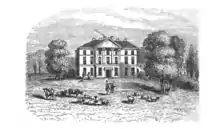Isaac Spooner
Isaac Spooner (c.1735–1816) was an English ironmaster and banker who founded Birmingham Bank.[1][2]

Life
Spooner was born to Abraham Spooner and Anne Knight, he went into the family iron business based around a furnace at Aston, in the Birmingham area. In 1791 he founded a bank with Matthias Attwood the elder, known then as the Birmingham Bank, which became the largest private bank in Birmingham with a clientele mostly consisting of farmers and manufacturers. In 1801, Birmingham Bank opened a London branch called Spooner, Attwood & Holman.[1][3][4] The bank Attwood, Spooner & Co. failed in 1865.[5]
Spooner's views were evangelical and abolitionist.[6] He owned an estate of over 2000 acres at Elmdon, West Midlands, where he completed Elmdon Hall, a development begun by his father Abraham in 1795, and which stood until its demolition in 1956. Elmdon Park remains in its place.[7]

Family
Spooner married Barbara Gough, daughter of Sir Henry Gough, 1st Baronet, sister of Henry Gough-Calthorpe, 1st Baron Calthorpe and granddaughter of the MP Reynolds Calthorpe.[8] They had children including:
- Abraham, who married the daughter of Luke Lillingston (great-nephew and heir of General Luke Lillingston) of Ferriby Grange, and took the name Abraham Spooner Lillingston.[9]
- Isaac, who married Miss Tyler of Redland in 1807.[10][11]
- Barbara Ann, who married William Wilberforce.[8]
- Anne, who married Edward Vansittart, son of George Vansittart and Vicar of Taplow, as his second wife, and was mother of Edward Vansittart Neale.[12][13][14]
- Henry, who attended Rugby School.[15]
- William, who became Archdeacon of Coventry.[6][16][17]
- Richard, who was a member of parliament. He married Charlotte, daughter of Nathan Wetherell.[1]
- John, who was a clergyman.[18]
There were nine in all, with the unmarried Eliza;[19] or ten.[4] Richard is said to be the ninth child in an 1885 Life of Thomas Attwood.[20]
Notes
- "Spooner, Richard (1783–1864), of Glindon House, Warws., History of Parliament Online". Retrieved 17 June 2015.
- The New Monthly Magazine. s.n. 1816. p. 569.
- 'Parishes: Elmdon', in A History of the County of Warwick: Volume 4, Hemlingford Hundred, ed. L F Salzman (London, 1947), pp. 67–69 http://www.british-history.ac.uk/vch/warks/vol4/pp67-69 [accessed 17 June 2015].
- John Pollock (20 December 2013). Wilberforce. David C. Cook. p. 137. ISBN 978-0-7814-1109-7.
- The Annual Register. Rivingtons. 1866. p. 28.
- David Newsome (1966). The Parting of Friends: The Wilberforces and Henry Manning. Gracewing Publishing. p. 26. ISBN 978-0-8028-3714-1.
- Edmund Richardson (7 February 2013). Classical Victorians: Scholars, Scoundrels and Generals in Pursuit of Antiquity. Cambridge University Press. p. 197. ISBN 978-1-139-62010-9.
- Wolffe, John. "Wilberforce, William". Oxford Dictionary of National Biography (online ed.). Oxford University Press. doi:10.1093/ref:odnb/29386. (Subscription or UK public library membership required.)
- The Annual Register, Or, A View of the History, Politics, and Literature for the Year. J. Dodsley. 1807. p. 60.
- "Spooner, Isaac (SPNR791I)". A Cambridge Alumni Database. University of Cambridge.
- John Aikin (1807). The Athenaeum: A Magazine of Literary and Miscellaneous Information. Longmans, Hurst, Rees, and Orme. p. 306.
- Lee, Matthew. "Neale, Edward Vansittart". Oxford Dictionary of National Biography (online ed.). Oxford University Press. doi:10.1093/ref:odnb/19820. (Subscription or UK public library membership required.)
- The Monthly Magazine. R. Phillips. 1809. p. 311.
- Lee, Sidney, ed. (1894). . Dictionary of National Biography. Vol. 40. London: Smith, Elder & Co.
- Rugby School Register. From 1675 to 1867 inclusive. With alphabetical index. Edited by F. Temple, Bishop of Exeter. 1867. p. 39.
- Rugby School (1867). Rugby School Register: From 1675 to 1867 Inclusive. Billington. p. 42.
- Sylvanus Urban (pseud. van Edward Cave.) (1857). Gentleman's Magazine, and Historical Chronicle. Edward Cave. p. 465.
- "Spooner, John (SPNR805J)". A Cambridge Alumni Database. University of Cambridge.
- John Burke (1836). A Genealogical and Heraldic History of the Commoners of Great Britain and Ireland Enjoying Territorial Possessions Or High Official Rank: But Uninvested with Heritable Honours. Colburn. p. 185.
- Wakefield, C. M. (1885). "Life of Thomas Attwood". Internet Archive. London: Harrison. p. 15. Retrieved 17 June 2015.